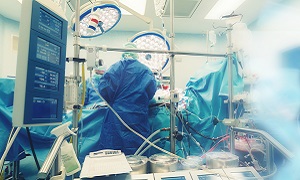Cost of Liver Transplant in India
| Treatment Required | Approximate Duration | Approximate Expenses | Stay in India after discharge | |
|---|---|---|---|---|
| Initial Evaluation | 2-5 Days (OPD) | $ 3000-3500 (both patient & donor) | ||
| Pre-Admission Investigations | 8-10 Days (OPD) | $2000-3000 (both patient & donor) | 1-2 weeks | |
| Liver Transplant Surgery | Approx. 21 Days' Hospital Stay for Patient; Approx. 10 Days' Hospital stay for Donor | $26000 in shared room; $28000 in single room | 1 month | |
Liver Transplant
Liver transplant is a surgical procedure in which a liver that can’t function properly is removed to replace it with a healthy liver from a deceased donor. It can also be replaced with a partial healthy liver from a living donor.
The liver is one of the body’s most vital organs and an individual can’t survive without it. The liver performs several critical functions, which includes-
- Processing the nutrients, hormones and medications
- Producing bile, which can help the body in absorbing fats, cholesterol as well as fat-soluble vitamins
- Removing degradation products of normal body metabolism
- Removing bacterial as well as toxins from the blood
- Preventing infections as well as regulating immune responses
A liver transplant is considered an option for people who are suffering from different kinds of severe complications due to chronic liver disease. Sometimes liver transplant is also considered a treatment option in rare cases where a previously healthy liver stops functioning all of a sudden.
Who Needs a Liver Transplant?
People requiring liver transplants usually have one or more of the following conditions:
Acute Liver Failure
Acute liver failure also known as fulminant hepatic failure, takes place when a healthy liver suffers injury due to which clinical signs and symptoms of liver insufficiency can be noticed. Multiple reasons can lead to acute liver failure, though the most commonly attributed reasons are acetaminophen overdose, viral infections, and ingestions of toxins like poisonous mushrooms. Unlike patients suffering from chronic liver disease who can survive from weeks to years without any kind of transplant, the patients of acute liver failure die within days if they don’t receive a transplant.
Chronic Liver Failure
The liver has an ability to repair itself in response to injury, although repeated injury and repair over many years can permanently scar the liver. The end-stage of this scarring is known as cirrhosis. It corresponds to the point where the liver is not able to repair itself anymore. When a person suffers from cirrhosis, he/she can show signs of inadequate liver function, which is labeled as ‘decompensated liver disease.’ Medications can help in decreasing the symptoms, but liver transplant is the only situation for a permanent cure.
Some of the major causes of cirrhosis that lead to liver failure include:
- Hepatitis B and Hepatitis C
- Alcoholic liver disease that can cause damage to the liver due to excessive consumption of alcohol
- Non-alcoholic fatty liver disease, a condition where fat eventually builds up in the liver and causes inflammation or liver cell damage
- Genetic diseases that affect the liver such as hemochromatosis, that causes an excessive iron buildup in the liver and Wilson’s disease, causing an excessive copper buildup in the liver
- Diseases that affect the bile ducts, which include primary biliary cirrhosis, primary sclerosing cholangiti and biliary atresia. Biliary atresia can be seen to be the most common reason for liver transplant among children.
A liver transplant can also be used to treat certain cancers that originate in one’s liver.
Preparing for the Liver Transplant
Choosing a transplant center
If your doctor recommends a liver transplant, you might be referred to a transplant center as well, though you are also free to choose one of your own or from your insurance company’s list of preferred providers.
- When you are considering a transplant, you should remember to learn about the types of transplants they perform and how many are performed each year.
- Also make an inquiry about the center’s survival rates. Try to understand the additional services they will provide as well, such as coordination of support groups, helping with local housing for the period of your recovery, etc.
- Also understand the overall costs that you will have to incur before, during and after your transplant.
Once you have selected your transplant center, you will require evaluation in order to determine whether you meet the eligibility requirements of the center. Therefore, you might need to undergo an evaluation at a different center, where a process will determine whether you are healthy enough to have surgery, whether you have any medical conditions that can interfere with the transplant and whether you are willing to take the required medications.
You will next undergo specific tests and procedures, which includes:
- Laboratory tests, which can include blood or urine tests, to access the overall health of your organs
- Heart tests, in order to determine how strong and healthy your cardiovascular system is
- Imaging tests, such as ultrasound of your liver
- A general health exam, which will include routine cancer screening tests to evaluate your overall health as well as to check for any other ailments that can impact the success of your transplant.
In addition to this, you might also need nutritional counseling, financial counseling, and psychological evaluation prior to the transplant.
Before the Procedure
After your tests are done, doctors will evaluate them to know the severity of your illness and how urgently you require your transplant. Your place on the waiting list will have to determined by this. Some people can receive a new liver after just a few days or weeks, while some people may need to wait years or even never receive a transplant.
Staying healthy
Staying healthy and active is extremely important, whether you are waiting for a donated liver or your surgery has already been scheduled. This will lead to speedy recovery as well. Keep all appointments with your healthcare team and also take your medications as prescribed by medical professionals.
Types of organ donors
Brain-dead organ donors
Most of the livers that we use for transplantation are obtained from patients who are brain dead. Brain death is caused as a result of a large stroke or massive trauma to the head due to a blunt injury or a penetrating injury. This kind of trauma can stop all brain functions although other organs such as the liver can continue to function properly.
Cardiac death organ donors
Sometimes when a patient suffers a devastating brain injury as well as carries a dismal neurological prognosis but doesn’t meat the strict criteria of brain death as there is still brain function, the patient’s family can choose to withdraw life-sustaining medical support in such a situation to allow the death of the patient. In such a scenario, it is defined as cardiac death rather than brain death. After this, if the family gives consent, organ donation can take place.
Living donors
Although all individuals have only one liver, it is actually possible to donate a portion of the liver for transplantation into another individual. The segmental anatomy can allow surgeons to create grafts of different sizes which depend upon the recipient’s requirement for liver tissue. The partial livers in the donor and as well as the recipient can grow eventually and provide the normal liver function for both of them.
During the Procedure
Deceased Donor Transplant
After you have been notified that a liver from a deceased donor is available, you should go to your hospital immediately and soon you’ll undergo an exam to make sure whether you are healthy enough for surgery.
General anesthesia is used during liver transplant surgery, so you will be sedated during the entire procedure.
The transplant surgeon begins by making a long incision across your abdomen in order to access your liver. According to your surgeon’s approach and your anatomy, the location and size of the incision can vary. Next, the surgeon will remove the diseased liver and place the donor liver into your body.
Once this is done, your surgeon will connect your blood vessels and the bile ducts to the donor’s liver. Depending on the severity of your condition, the surgery might even take up to 12 hours.
Once the new liver has been put in place, the surgeon uses stitches as well as staples to close the incision. After this is done, you are taken to the intensive care unit so that you can begin recovery.
Living-donor liver transplant
If you are receiving your new liver from a living donor, the surgery will have to be scheduled in advance.
Initially, the donor is operated upon and the portion of the liver for transplant is removed. After this, surgeons remove the diseased liver, after which the new donated liver portion is placed in your body. After this, they connect your blood vessel and bile ducts to the new liver
The transplanted liver portion in your body as well as the portion left behind in the donor’s body, generates rapidly and within several weeks it can reach normal volume.
After the Procedure
After your procedure is complete, you may have to stay in the intensive care unit for some days. Medical professionals will need to monitor your condition and also watch for signs of complications. They will also test your liver function frequently to look for signs that the new liver is working. Once you are out of the intensive care unit, you will need to stay for some days in a transplant recovery area.
Your transplant team can design a checkup schedule for you and you might need to undergo blood tests a few times every week. After the transplant, you will also need to take medications such as immunosuppressants for the rest of your life. This drug keeps your immune system from attacking your new liver, while other drugs can help reduce the risk of complications.
To be fully healed might require up to six months. How much time it takes also depends on how severe your condition was, prior to the transplant.
After the transplant, you can choose to join a support group for transplant recipients. It is also quite important to eat a well-balanced diet in order to help you recover and keep the liver healthy.
Risks and complications
Like most transplants, liver surgery carries a risk of significant complications, which are associated with the procedure itself as well as the drugs that are required to prevent rejection of the donor’s liver once the transplant is complete. Some of the risks that can come with the procedure include:
- Bile duct complications, which can include shrinking of the bile ducts or bile duct leaks
- Bleeding
- Blood clots
- Failure of a donated liver
- Infection
- Rejection of donated liver
- Mental confusion or seizures
If the complications that occur are long-term, it might also lead to the recurrence of the liver disease in the transplanted liver.
Medication side effects
After a liver transplant you will need to take medications for the rest of your life in order to prevent your body from rejecting the new liver. However, these anti-rejection medications can cause multiple side-effects, such as-
- Bone thinning
- Diabetes
- Diarrhea
- High Cholesterol
- High blood pressure
- Headaches
Since the anti-rejection drugs work by suppressing the immune system, they increase the chances of infection as well.




